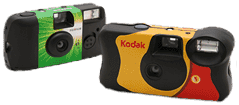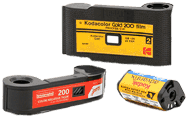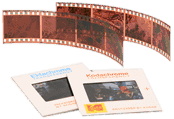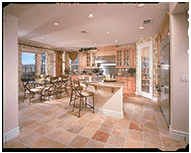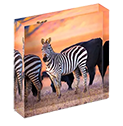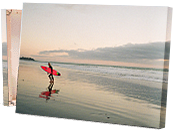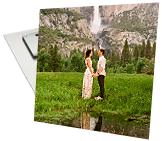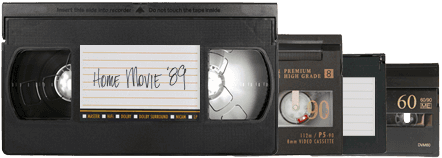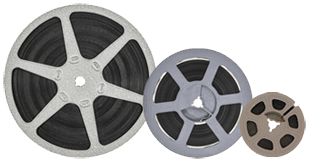
It’s the Star Trek vs Star Wars battle of the photography world. The two most common types of cameras, both carry their own pros and cons. In general, we’ve found rangefinders are great for street photography, given that they’re quiet, compact and sharp. But they front a steeper learning curve if you’re a beginner. SLR’s, on the other hand, are larger and louder, but much more versatile and easy to learn.
So which do you choose? The reality is, if you took a tally, you’d find die-hards in both camps.
For those of you caught in the middle, we’ve put together a list of things we love (and don’t love) about both.
RANGEFINDER

PROS:
No Mirror
Because rangefinders do not have a mirror, they are commonly more compact and have a quieter shutter. This makes them great for street photography. On top of that, the lens sits closer to the film plane in a rangefinder, often resulting in sharper images. A mirror-less body also means no shutter shake. Now you can shoot handheld at lower shutter speeds and say “sayonara” to your tripod.
Viewfinder
Rangefinders have a larger viewfinder that is separate from the lens which allows greater field of vision and, in turn, enhances your ability to see your subject enter the frame, helping anticipate your shot.
CONS
Shutter Speed
Rangefinders typically have slower shutter speeds. This means you can’t open up your aperture as wide/as fast as you’d want in daylight and may not be able to control your depth of field as easily.
Viewfinder
While a rangefinder’s viewfinder is a good thing, it also has some drawbacks. Since you aren’t looking through the lens itself, you are more apt to cover it with your finger, forget your lens cap, etc. The viewfinder also makes a rangefinder not an ideal portrait camera because you aren’t composing or focusing through the lens. Rangefinders are also harder to focus in low light.
Rangefinder Examples
- Rangefinder example taken with a Canon Canonet Portra 160
- Rangefinder example taken with a Canon Canonet
- Rangefinder example taken with a Canon Canonet Portra 160
- Rangefinder example taken with a Canon Canonet Portra 800
SLR (Single Lens Reflex)

PROS
Mirror
Since SLRs contain a series of mirrors, you see, compose, and focus through the lens. This allows you to preview your depth of field which makes SLRs great for portraits and action photography. With their straightforward split image focusing, what you see is what you get. Additionally, SLRs commonly have faster shutter speeds than most rangefinders, which gives you the ability to stop down and shoot at faster apertures in daylight.
Accessibility
Love them or hate them, SLR cameras simply are more common, more widely made, and have a broad range of affordable, interchangeable lenses.They’re a safe bet for beginners as they are generally easier to learn on, but their incredible versatility also makes them ideal for professional photographers.
CONS
Mirror
The presence of a mirror does make SLR cameras larger, louder, and heavier than the average rangefinder. And the shutter reflex increases camera shake, which means you might not want to shoot hand-held at lower shutter speeds.
SLR Examples
- SLR Example taken with Portra 400
- SLR Example taken with Porta 400 at 800
- SLR Example taken with Provia-100f at 200
- SLR Example
SUMMARY
In the end, it all comes down to preference. If you want a compact travel camera that’s quiet, super sharp, and virtually pocket-sized – a rangefinder may be for you. Or, if you favor a more versatile camera with a wider range of lenses and don’t mind the extra size – an SLR could be your best bet. Both camera systems can produce amazing results and both happen to be a lot of fun to shoot with.
With that in mind, we recommend you try both out if you can. The reality is, there are a lot of affordable, entry-level rangefinders & SLRs out there to choose from. Who’s to say you can’t have one of each?
Now that you know the difference from a Rangefinder, see how the Leica Rangefinder compares to a $200 Canon Canonet.
Some of our favorite Rangefinder and SLR cameras:
Favorite Rangefinders of The Darkroom
- Canon Canonet QL17 GIII
- Yashica Electro 35 GSN
- Minolta Hi-Matic E
- Olympus 35 RC
Favorite SLR Cameras of The Darkroom
- Nikon FM series
- Olympus OM-1
- Canon AE-1 Program
- Pentax K1000
 Co-written by Hannah Lush and The Darkroom Chief Photographer, Trev Lee.
Co-written by Hannah Lush and The Darkroom Chief Photographer, Trev Lee.
Hannah Lush is a freelance writer from Sacramento, California. When she isn’t stalking her favorite coffee shops and contributing to her blog, she enjoys all things Sci-Fi and hanging out with her dog, Mulder.
For more information, visit her website hannahlush.com.



 My Account
My Account

